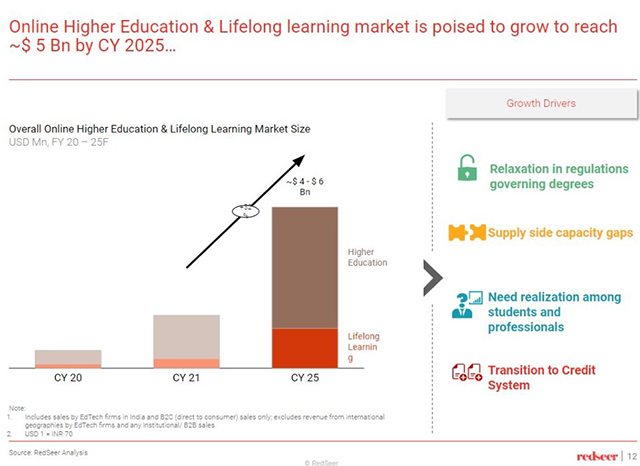
Higher education, lifelong learning to drive India’s EdTech market growth: Report


The online higher education and lifelong learning market within India’s EdTech space is poised to hit $5 billion by 2025, and will be driven by the easing of regulations governing degrees, according to management consulting and market research firm Redseer. India’s online education market, which includes K12, higher education and lifelong learning or upskilling, is currently pegged around $1.9 billion.
In the past two years, Indian EdTech startups rose to the fore when the Indian government shut down educational institutes amidst a deadly Covid-19 pandemic. According to Statista estimates, the present market valuation of the Indian Edtech industry is $2.8 billion and is expected to reach $10.4 billion by 2025.
At present, there are nearly 10,000 EdTech startups in India, according to India Brand Equity Foundation. This trend is further augmented by factors like India’s burgeoning internet economy and increased smartphone usage. Technologies like cloud, AR/VR, and blockchain, among others are supporting this growth.

Another growth driver is the supply-side capacity gaps. India has supply-side constraints in education infrastructure (especially for specialised courses). Transition to the credit system as well as the realisation of the need for higher education by students and working professionals who are new to the workforce, is further contributing to the boom in this sector, the report said.

“India’s booming EdTech market, which saw multiple startups and increased funding during the pandemic, is expecting further boost on the back of growth in higher education and lifelong learning segments,” said Abhishek Gupta, Engagement Manager at Redseer.

The market for online lifelong learning also will expand further with “further push after Covid as the economic uncertainty further establishes the need for continuous learning,” the report noted.
Apart from Covid, existing skills getting increasingly redundant, job creation lagging behind new additions to the workforce annually, and a mismatch between industry requirements versus education curriculum in colleges are the other reasons for growth, added Gupta.
The report further stated that the user base for online higher education grew by 75% in 2021, despite a three times growth in the average ticket size compared to the K12 segment.

The findings also saw that there was a steep uptake in mergers and acquisitions (M&A) activity as well. With millions of young people in India (both students and professionals) looking to gain access to world-class education and training, online higher education has become a key sector in the Indian education landscape. The future is surely bright for this sub-segment, making it an exciting space to watch.
